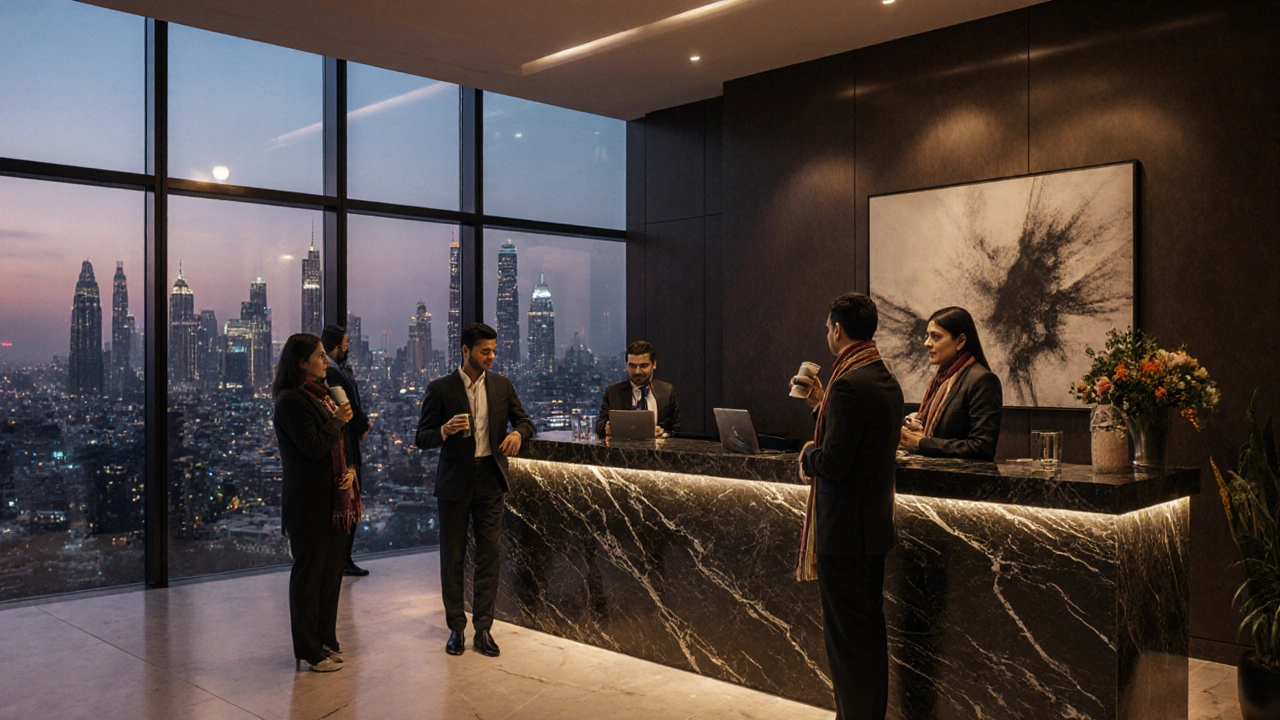Business Hotel or Resort Decision Maker
Answer the questions below to determine whether a business hotel or a resort is better suited for your trip.
1. What is the primary purpose of your trip?
2. How long is your stay?
3. Who are you traveling with?
4. What matters most to you during your stay?
Trying to decide where to stay can feel like a maze, especially when the options span the corporate world and a tropical getaway. The real question isn’t just "where?" but "what kind of experience will actually suit the purpose of my trip?" Below we break down the essential distinctions between a business hotel and a resort so you can match your stay to your agenda, budget, and vibe.
What Is a Business Hotel?
When traveling for work, business hotel is a lodging type designed primarily for corporate guests, offering features such as on‑site meeting rooms, high‑speed internet, and 24‑hour business centers. These properties usually sit near major airports, conference venues, or downtown financial districts, making it easy to hop from a boardroom to a brief lunch. Typical room layouts prioritize ergonomics: a comfortable chair, a sizable desk, and ample power outlets. On‑site services often include express laundry, in‑room workstations, and a quiet lounge where professionals can network before or after meetings.
What Is a Resort?
In contrast, a resort is a property that centers its offering around recreation and relaxation, bundling accommodation with extensive leisure facilities such as pools, spas, golf courses, and all‑included dining. Resorts are usually located in vacation hotspots-think beachfront strips, mountain ski villages, or desert oases-and they aim to keep guests on‑site for the entire stay. Suites often feature expansive balconies, lush décor, and multiple entertainment options right at the doorstep. The atmosphere leans toward leisurely, with schedules that flow around sunrise yoga, sunset cocktails, and kids’ club activities.
Core Differences at a Glance
- Target audience: Business hotels cater to corporate travelers, conference attendees, and solo professionals; resorts attract families, couples, and leisure‑focused tourists.
- Primary purpose: Business hotels enable productivity and connectivity; resorts prioritize relaxation and recreation.
- Typical location: Business hotels cluster near airports, convention centers, and city centers; resorts sit in scenic destinations-coastal, alpine, or desert locales.
- Common amenities: Business hotels offer fast Wi‑Fi, meeting rooms, executive lounges; resorts provide pools, spas, multiple restaurants, and on‑site activities.
- Pricing structure: Business hotels often have flexible rates with corporate discounts and per‑night billing; resorts frequently bundle meals, drinks, and activities into an all‑inclusive package.
- Atmosphere: Business hotels maintain a quiet, business‑like tone; resorts foster a lively, resort‑style vibe with background music and social events.
When a Business Hotel Is the Smart Choice
- **You need a reliable workstation.** Fast, wired internet and ergonomic desks let you finish reports after a day of meetings.
- **Your itinerary is packed with appointments.** Proximity to conference venues or airports cuts commute time.
- **Flexibility matters.** Early‑check‑in, late‑check‑out, and 24‑hour front‑desk service accommodate unpredictable schedules.
- **Corporate rates apply.** Many companies have negotiated discounts, reducing per‑night costs.
- **You prefer a low‑key environment.** Quiet lounges and business centers let you focus without resort‑style distractions.
For example, a project manager attending a three‑day summit in Chicago may book a business hotel downtown because the venue is a 10‑minute walk away, the hotel offers a complimentary high‑speed VPN, and the loyalty program adds free nights after a series of stays.

When a Resort Beats a Business Hotel
- **Your trip is all about downtime.** If you’re looking to unwind after a hectic quarter, the on‑site spa and pool provide instant stress relief.
- **You’re traveling with family.** Kids’ clubs, babysitting services, and multiple dining options keep everyone happy.
- **You want an all‑inclusive price.** Bundled meals, drinks, and activity fees simplify budgeting.
- **Location is the highlight.** A beachfront resort lets you step onto sand for breakfast; a mountain resort offers ski‑in/ski‑out access.
- **Social experiences matter.** Evening entertainment, live music, and themed nights create memorable moments.
Consider a family of four heading to a Caribbean island for a week. Choosing a resort means they can enjoy kids’ swim lessons, a family‑friendly buffet, and nightly shows without leaving the property, turning logistics into pure enjoyment.
Quick Comparison Table
| Feature | Business Hotel | Resort |
|---|---|---|
| Primary Guest Type | Corporate travelers, solo professionals | Families, couples, leisure tourists |
| Location Focus | Near airports, city centers, convention venues | Scenic destinations - beach, mountain, desert |
| Key Amenities | Meeting rooms, high‑speed Wi‑Fi, executive lounge | Pools, spas, multiple restaurants, on‑site activities |
| Pricing Model | Per‑night, corporate discounts, flexible rates | All‑inclusive packages, bundled meals & drinks |
| Atmosphere | Quiet, work‑oriented, professional | Relaxed, social, entertainment‑driven |
| Check‑in Flexibility | Early/late options, 24‑hour front desk | Standard check‑in times, sometimes limited early check‑in |
How to Decide Which One Fits Your Trip
Start by writing down the top three goals of your travel. If "finish the quarterly report," "attend a networking event," and "stay within a corporate budget" top the list, a business hotel checks all the boxes. If "sunbathe on a private beach," "let the kids try paddle‑boarding," and "have dinner without separate checks" dominate, the resort wins.
Next, consider the length of your stay. Short, purpose‑driven trips (1‑3 nights) usually align with business hotels. Longer vacations (4+ nights) allow you to take full advantage of a resort’s amenities.
Finally, factor in the travel companions. Solo or single‑occupancy travelers often enjoy the streamlined service of a business hotel, while groups benefit from the shared spaces and activity variety a resort offers.
Key Takeaways
- Business hotels prioritize productivity; resorts prioritize leisure.
- Location, amenities, and pricing models differ dramatically.
- Match your primary trip objectives, length, and companions to the hotel type.
- Use the comparison table as a quick reference before booking.
Frequently Asked Questions
Can I host a business meeting at a resort?
Yes, many upscale resorts offer conference rooms and banquet halls. However, the cost is usually higher than a dedicated business hotel, and the atmosphere may feel less formal.
Do business hotels provide free Wi‑Fi?
Free high‑speed Wi‑Fi is considered a baseline amenity in most business hotels, often with wired connections available in rooms and meeting spaces.
Is an all‑inclusive resort worth the extra cost?
If you plan to eat multiple meals, enjoy drinks, and partake in activities without leaving the property, the bundled price can save you up to 30% compared to paying out‑of‑pocket at a hotel‑only property.
What should I look for in a business hotel’s executive lounge?
Key features include complimentary snacks and beverages, a quiet work environment, private meeting pods, and often a view of the city for a relaxed yet professional ambiance.
Can families stay at business hotels?
Many business hotels accept families, but they usually lack kid‑focused amenities like pools, kids' clubs, or extensive dining options that resorts provide.
